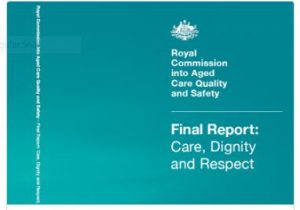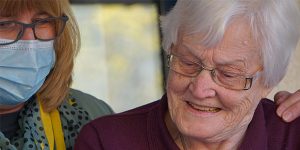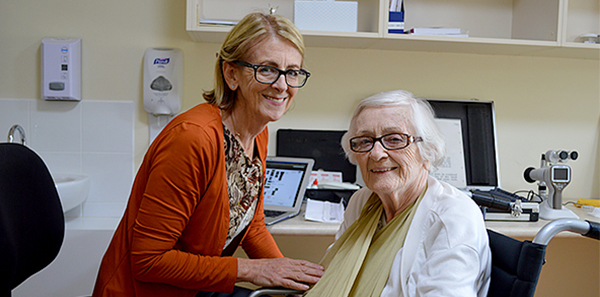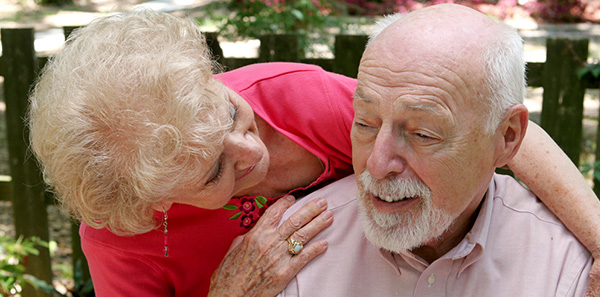1:30min


Photo courtesy Georg Arthur Pflueger on Unsplash
By Helen Carter
Journalist
The Royal Commission into Aged Care Quality and Safety has recommended that aged care providers have arrangements with optometrists by July 2024 to provide services as required to people receiving care.
The Royal Commission into Aged Care Quality and Safety Final Report: Care, Dignity and Respect, tabled in Parliament on March 1, also recommended making low vision aids and technologies more accessible for older Australians.
The report states ‘to ensure residential aged care includes a level of allied health care appropriate to each person’s needs, the System Governor should, by no later than 1 July 2024, require approved providers to have arrangements with optometrists and audiologists to provide services as required to people receiving care.’
Optometry Council of Australia and New Zealand Executive Officer Sian Lewis said recommendation 38 on residential aged care to include allied health care urged aged care providers to provide allied health services to residents in accordance with their individual care plans.
And recommendation 82 recommended a review of health professions’ undergraduate curricula.
It states: ‘In conducting their regular scheduled reviews of accreditation standards, the relevant accreditation authorities should consider any changes to the knowledge, skills and professional attributes of health professionals so that the care needs of older people are met.’
Currently optometrists who provide domiciliary visits to aged-care facilities and patients in their homes receive the domiciliary benefit under the Optometric MBS, which is an additional loading intended to account for travel and equipment transport.
This applies to optometrists visiting a patient’s home, residential aged-care facility or other institution. Optometrists providing this service bill MBS item numbers 10931-33 (the domiciliary loading benefit.)
A 2012 Optometrists Association member survey found that fewer than five per cent regularly provided care in an aged-care facility and in 2012-2013, nearly 15,000 MBS claims were made for domiciliary services.
By 2018-2019, 21,438 MBS claims were made for domiciliary services but coronavirus restrictions limiting visits last year meant there were about 3,700 fewer domiciliary visits in 2019-2020, dropping to 17,674.
Optometry Australia continues to lobby for improved domiciliary care loading.

Optometrist Susan Kalff consulting with domiciliary care patient Nina in 2014 at Village Baxter, Frankston. Photo, Helen Carter
Macular Disease Foundation Australia CEO Dee Hopkins welcomed the report’s recommendation to make low vision aids and technologies more accessible for older Australians.
The report recommends that ‘everyone living with a disability in the aged-care system should receive daily living supports – such as assistive technologies, aids and equipment – at a level equivalent to what someone under the age of 65 years would receive in the National Disability Insurance Scheme (NDIS).’
Ms Hopkins said that if the Commonwealth Government adopted this recommendation, more than 100,000 older Australians living with low vision or blindness would have greater and more equitable access to low vision aids and technology to improve their quality of life and maximise independence.
‘Assistive technology, aids and equipment can transform the lives of people with vision loss, helping them maintain their independence and continue doing the things they love to do. But many older Australians simply cannot afford this life-changing equipment,” Ms Hopkins said.
‘We applaud the Royal Commission for making this crucial recommendation, and we implore Health Minister Greg Hunt and Prime Minister Scott Morrison to adopt it so older Australians with vision impairment can finally get the practical support they need to improve independence and quality of life.
’Adopting the Royal Commission’s recommendations to fully integrate aids and equipment into the aged-care system would be life-changing for many older Australians living with low vision or blindness. We look forward to the Commonwealth Government’s comprehensive response in the upcoming Federal Budget’.
Ms Hopkins said there were also younger Australians, who are ineligible for the NDIS, who would greatly benefit from being able to access low vision aids and technology.
In 2017, a report by the Foundation and the George Institute for Global Health, Low Vision, quality of life and independence: A review of the evidence on aids and technologies, highlighted barriers to accessing low vision aids and technology in aged-care and state and territory programs, and called for a nationally funded program.

Improving access and getting support sooner
Vision 2020 Australia also welcomed these and other recommendations relating to blindness or low vision in the final Royal Commission report including:
- Establishing levels of support through aged care equivalent to those available via the NDIS, addressing the current inequity between the systems.
- Streamlining and enhancing assessment processes, which should enable older Australians who develop vision loss to get the support they need sooner.
- Improving access to specialist health care and other health services, including in rural and regional areas which could help tackle the problem of older Australians, particularly in residential aged care, not getting the eye care they need.
- Enhancing aged care workforce skills and capability, an area where Vision 2020 Australia is seeking funds through the next federal budget to implement an innovative model to enhance the knowledge and skills of aged care workers who work with people who have vision concerns.
- Establishing tailored pathways for Aboriginal and Torres Strait Islander people who need aged care support, an important part of the broader work done to ensure that all Australians can access culturally safe care and support.
Vision 2020 Australia’s submission to the 2020/21 Federal Budget looks to address these areas of concern, calling for $37.38 million over four years for enhancements to the current aged care system to make it simpler, quicker and more affordable for older Australians who develop or live with permanent vision loss to get the technology and supports they need.
Vision 2020 Australia CEO Judith Abbott said: ‘We estimate that there are currently 588,000 older Australians living with blindness or vision loss and this is forecast to grow significantly over the coming decade, so we welcome changes to the aged care system that can improve their lives.
‘As the peak body for the eye health and vision care sector, Vision 2020 Australia looks forward to continuing to work with Ministers Hunt and Colbeck and the broader Morrison Government to implement these recommendations so that all older Australians, including those who experience vision loss, are fully supported within the aged care system.’
Resources for optometrists and aged care providers
Read more here about aged care providers and optometrists.
Optometrists can also download Optometry Australia’s ‘Medicare item use guide’ and read further guidance on domiciliary billing items. Medicare Items 10931, 10932 and 10933 provide financial assistance in the form of loading to the optometrist, to compensate for costs involved with travel, packing etc. This loading is in addition to the consultation item. The Guide also includes guidance on private billing, if the optometrist does not wish to bulk-bill.
Optometry Australia’s Mentoring Program also has an ‘aged care/mobile optometry’ category for optometrists who want to connect with other optometrists around Australia who are interested in aged-care optometry services, for advice and support.
Tagged as: Advocacy & government, AHPRA & OBA, AMD, Eye examinations, Future, Medicare-MBS-PBS, Patient management